Any football or basketball coach who wants to win and keep his job is going to put the best players out on the field or court. This is as it should be. Nevertheless, I get sick of mono-cultural sports. A quick glance at virtually any college or pro game these days shows black, black and more black. I often holler, “Where’s the diversity, man?” before turning my attention elsewhere.
As stated in a different article, I was deeply, profoundly pleased to read about and watch the exploits of Matt Boling at Jesuit High School in Houston in 2019. This young White athlete really put the wood to his black competitors in the 100, 200 and 400 meters. So fast was he that 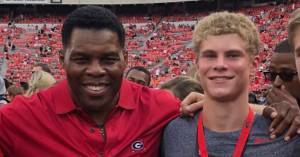 he could have turned around before reaching the finish line and asked them, “Who’s your daddy?” Boling’s freshman year at the University of Georgia went quite well.
he could have turned around before reaching the finish line and asked them, “Who’s your daddy?” Boling’s freshman year at the University of Georgia went quite well.
My focus here is football. I am prompted to write because of something I came across while perusing the Internet. An unidentified black person composed a little ditty entitled “Ode to the White Running Back.” Dated October 8, 2007, it went like this:
In days of yore, you ran free in packs,
All over the field, White running backs.
Fast black runners with amazing grace,
Slowly began to take your place.
Once there was Riggins and his mohawk,
Now you line up and mostly block.
Slow of foot and without much style,
We watch you try and it makes us smile.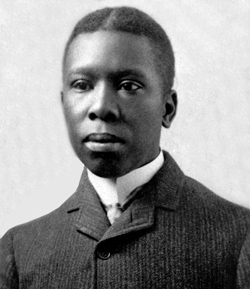
You lower your shoulders and get three yards,
Moving less like backs, more like guards.
They talk of your motor and how hard you compete,
And try not to mention your clumsy feet.
But like the infrequent moon that’s blue,
There are the times you still come through.
At the end of the game, it couldn’t come later,
You drove through the line to defeat the Gator.
Jacob Hester, we will cut you some slack,
You aren’t too bad for a White running back.
Wow, that’s snide, condescending and loaded with put-downs both subtle and blatant! Our poet is no Paul Dunbar, no Langston Hughes, no Richard Wright. He acknowledged John Riggins and Jacob Hester. Having never heard of the latter, I had to look him up. An LSU grad, Hester had five years with the San Diego Chargers and Denver Broncos, gaining 400 yards, catching 56 passes and scoring 6 times. That ain’t much. Riggins, by contrast, was a Super Bowl MVP and is in the Pro Football Hall of Fame.
Our rhymester could have mentioned Frank Gifford, Hugh McElhenny, Jim Taylor, Paul Hornung, Larry Csonka, Craig James, Merril Hoge or Mike Alstott. He might have gone back a little further in time for Red Grange, Steve Van Buren, Doak Walker or Kyle Rote. Look, I am not about to claim that a single one of these White RB’s is an all-time great. There are too many black guys who would have to be acknowledged 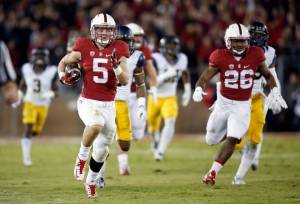 first—Marion Motley, Joe Perry, Jim Brown, Abner Haynes, Cookie Gilchrist, Gale Sayers, Leroy Kelly, Floyd Little, O.J. Simpson, Walter Payton, Tony Dorsett, Earl Campbell, Herschel Walker, Eric Dickerson, Marcus Allen, Barry Sanders, Emmitt Smith, Terrell Davis, Edgerrin James, Priest Holmes, Ricky Williams, Jamal Lewis, Curtis Martin, LaDainian Tomlinson, Adrian Peterson, Ezekiel Elliott, Derrick Henry and quite a few more.
first—Marion Motley, Joe Perry, Jim Brown, Abner Haynes, Cookie Gilchrist, Gale Sayers, Leroy Kelly, Floyd Little, O.J. Simpson, Walter Payton, Tony Dorsett, Earl Campbell, Herschel Walker, Eric Dickerson, Marcus Allen, Barry Sanders, Emmitt Smith, Terrell Davis, Edgerrin James, Priest Holmes, Ricky Williams, Jamal Lewis, Curtis Martin, LaDainian Tomlinson, Adrian Peterson, Ezekiel Elliott, Derrick Henry and quite a few more.
No White player has led the NFL in rushing since 1962 when Taylor did so with the Green Bay Packers. Had Cleveland’s Brown not dealt with injuries during that season, he would have had his usual top spot. (Injuries, of course, are part of the game.) Henry was the number one ground gainer in 2019, followed by Elliott, Nick Chubb, Christian McCaffrey, Chris Carson, Joe Mixon, Leonard Fournette, Dalvin Cook, Marlon Mack and Sony Michel. All are black with one exception: McCaffrey of the Carolina Panthers. The poet made reference to a blue moon—a colloquial term meaning “very rare.” Boling may qualify in the realm of track and field, and I dare say the Panthers’ number 22 does as well.
Let’s take a look at McCaffrey, whose father Ed was a wide receiver for the New York Giants, San Francisco 49ers and Denver Broncos, and won three Super Bowl rings; he played college ball at Stanford, as did his son. Standing 5′ 11″ and weighing 205 pounds, he had 6,987 all-purpose yards and scored 33 touchdowns. McCaffrey ran, caught passes, and returned kicks and punts. He came in second in Heisman 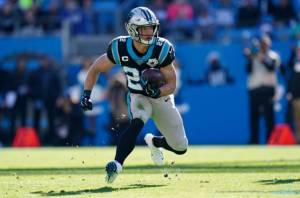 Trophy voting in 2015. With the Cardinal in college and with the Panthers in the NFL, he has proven himself a gamer. He’s tough, he’s quick, he can slip a tackle, and he’s durable. Furthermore, he is such a complete player that he makes opposing defenses hesitate to “stack the box.”
Trophy voting in 2015. With the Cardinal in college and with the Panthers in the NFL, he has proven himself a gamer. He’s tough, he’s quick, he can slip a tackle, and he’s durable. Furthermore, he is such a complete player that he makes opposing defenses hesitate to “stack the box.”
McCaffrey is not slow of foot or without much style, he does not run more like a guard than a back, and he does not have clumsy feet, as the poet would have us believe. His running and receiving numbers for Carolina have done nothing but improve over three seasons: 1,086 yards as a rookie in 2017 (scoring 7 times), 1,965 in 2018 (13) and 2,392 last year (19). I should add that he’s a superb blocker and that he seldom fumbles. McCaffrey, who just signed a four-year, $64 million contract, is arguably the best running back—White or black—in the NFL.
I enjoy watching black defenders futilely chasing McCaffrey downfield and into the end zone. Very much so. But there is yet another reason I like young Mr. McCaffrey: his sculpted and muscular body is entirely free of tattoos.
It is quite possible that he has peaked and may never again approach what he did those fabulous first three seasons. A serious injury or even a string of minor ones could render McCaffrey just an average RB, and once that happens you’re on your way out of the league. The shelf life for ball carriers these days is mercilessly brief.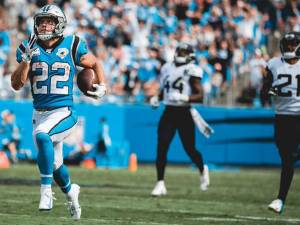
I would love to know what college scouts candidly said about him coming out of Valor Christian High School in suburban Denver. Did they discount him because he was White? Although McCaffrey’s three years at Stanford were most impressive, NFL people must have had their doubts. “He’s not black,” they probably said to each other. “Only black guys can make it as pro running backs.”
McCaffrey’s game somewhat resembles that of Marshall Faulk (who strutted his stuff for the Indianapolis Colts and St. Louis Rams between 1994 and 2006) in terms of versatility. Faulk was noted for his “football IQ,” a trait McCaffrey seems to share. In my opinion, he is poetry in motion.

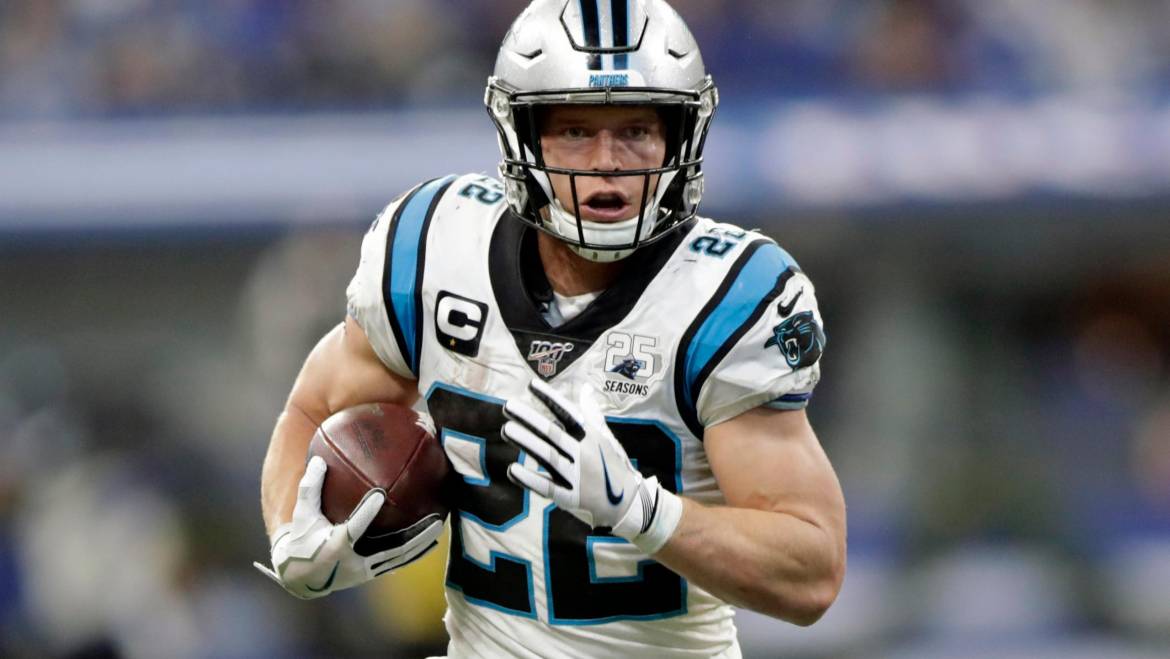
12 Comments
The black athlete found his/her niche in sports, no doubt, when whites opened the door and gave them the chance.. And the black athlete has dominated sports, which makes it funny that the NFL once thought a black could never play quarterback in said league. Weren’t smart enough, they said. Not even full human, they said.
I applaud the black athlete. The black athlete has made all sports more entertaining to watch. And, if they want to write poems or riddles about how well they are doing, so be it. There is much truth to it.
Thanks Richard.
I cannot understand why anybody would want to be mocked or ridiculed, but that may be the state of guilt-ridden Whites these days in the USA. And not all blacks dominate, as may be seen in Boling and McCaffrey.
True..athletes come in all sizes, shapes, genders, and colors…on that I’m sure we can all agree. Great article Richard.Thank you.
You said it well, Jim. There are all kinds of jocks, and we should be able to appreciate the whole spectrum.
Richard, I saw this a few days ago and read it. It is well written, as usual, and your descriptions of the evolution of the black athlete have historical significance. While it shouldn’t matter, but did years ago, the black athlete is perceived to have superior athletic ability when compared to their white counterparts. It strikes me as being a commentary on the evolution of equality in terms of evaluation, opportunity and wages/pay scale, not to mention higher education. Should we begrudge black athletes because they are better for the most part
? I would say no, of course not. If you earn it, you are allowed to own it. They were not allowed any such thing for decades…if it is their time now, so be it and with good will. Great writing as always.
Bettye, Legal Asst. to D. Lyle Wood
Bettye, there is perception and there is reality. This issue has some of both. I hope I made clear that I do not begrudge black athletes anything. As to whose time it is now, in the NFL, it is Christian McCaffrey’s time. He and Matt Boling have had to overcome the perception that White athletes are somehow inferior.
We have had great black and white football players and I salute the many I consider to go beyond. What is expected . The black player had to prove themselves in all sports and that they did so I say we have had great players whether black or white but it is now Mccaffreys times to shine .i applaud them all regardless of race or color.
That’s true, Cathy. Let’s applaud all the great ones whether White or black. But if this neo-racist black poet, this would-be Paul Dunbar, had just kept his mouth shut I would not have been compelled to write. On the other hand, the Panthers’ McCaffrey is just so darn great. I admit, I like it…I like it a lot.
Richard:
Very nicely done with good information. Who was the last white running back to gain over 1,000 yards (I believe it was Craig James). I agree with you about McCaffrey – he is the best all-around back in the NFL.
Best wishes,
Rex Lardner
Rex: Having written this thing, I have come to the conclusion that McCaffrey is the best White running back ever. The moment I say so, however, I realize that is damning with very faint praise. Let’s see if he can stay at his current level (or even improve) over the next few seasons.
The Patriots were the whitest team in the NFL a few years ago when they were almost unbeatable. Wide receivers, tight ends, quarterback, running backs, and the line. That is changed now, and they aren’t as good as they were. Everyone has different skills and abilities, both mental and physical. You can only safely mention the physical though!
An upper-case “W,” if you please! I am doing all I can to subvert the prevailing politically correct paradigm.
Add Comment